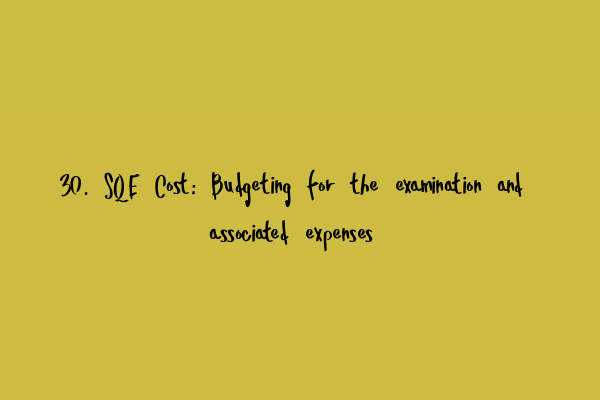SQE Cost: Budgeting for the Examination and Associated Expenses
Preparing for the Solicitors Qualifying Examination (SQE) requires both time and financial investment. In this blog post, we will discuss the costs associated with the SQE and provide tips on budgeting for the examination. Whether you are a student or a working professional, it is essential to plan your finances effectively to ensure success in the SQE.
Understanding the Examination Fees
The SQE is divided into two stages: SQE1 and SQE2. Each stage has its own examination fees. SQE1 covers multiple-choice questions (MCQs), while SQE2 focuses on assessing practical legal skills.
For SQE1, the examination fee is £1,558. This fee covers both attempts at the examination. It is important to note that this fee is subject to change, so it is advisable to check the latest updates from the Solicitors Regulation Authority (SRA).
The examination fee for SQE2 is £2,422. Similar to SQE1, this fee covers both attempts at the examination.
It is crucial to budget for these examination fees in advance to avoid any last-minute financial stress. Take into account the number of attempts you may need, as additional attempts will incur additional fees.
Additional Expenses to Consider
In addition to the examination fees, there are other associated expenses that you should consider while budgeting for the SQE.
1. Preparation Materials
Investing in high-quality preparation materials is essential for success in the SQE. These materials may include textbooks, study guides, sample papers, and online resources. While there are free resources available, some paid resources provide comprehensive coverage and practice materials that can significantly improve your chances of success.
Check out our related article on SQE Sample Papers: Practice for Exam Success for more information on using sample papers to enhance your preparation.
2. Training Courses
Training courses offered by SQE training providers can be beneficial in developing a structured study plan and enhancing your understanding of the exam content. These courses often come at a cost, but they provide expert guidance and support throughout your preparation journey.
For tips on adjusting your SQE strategy based on mock performance, check out our related article Adjusting Your SQE Strategy Based on Mock Performance.
3. Practice Mock Tests
Mock tests are a crucial part of SQE preparation, as they help familiarize you with the exam format and improve your time management skills. Some training providers offer interactive mock tests that simulate the real exam experience. Investing in these mock tests can greatly enhance your engagement and learning process.
Learn more about the benefits of interactive mock tests in our related article Interactive mock tests for SQE: Enhancing engagement and learning.
4. Travel and Accommodation
If you need to travel to a different city or country to take the SQE, factor in travel and accommodation expenses. Planning in advance can help you find the best deals and save costs.
Tips for Budgeting for the SQE
Now that you are aware of the various costs associated with the SQE, here are some tips for effective budgeting:
- Start budgeting early: Begin saving for the examination and associated expenses as soon as possible.
- Research different training providers: Compare the costs and offerings of different training providers to find the best fit for your budget and study needs.
- Utilize free resources: While paid resources can be valuable, don’t overlook the free resources available online. Our article on Conquer the Multiple Choice Questions (MCQ) in SQE1 provides valuable tips for tackling MCQs effectively.
- Consider a study loan: If necessary, explore the option of taking a study loan to cover the examination and preparation expenses.
- Create a budgeting spreadsheet: Keep track of your income, expenses, and savings to ensure you stay on track with your budgeting goals.
By following these tips, you can effectively budget for the SQE and minimize financial stress during your preparation journey.
Remember, the SQE is an investment in your career, and proper financial planning is key to achieving success. Good luck!
